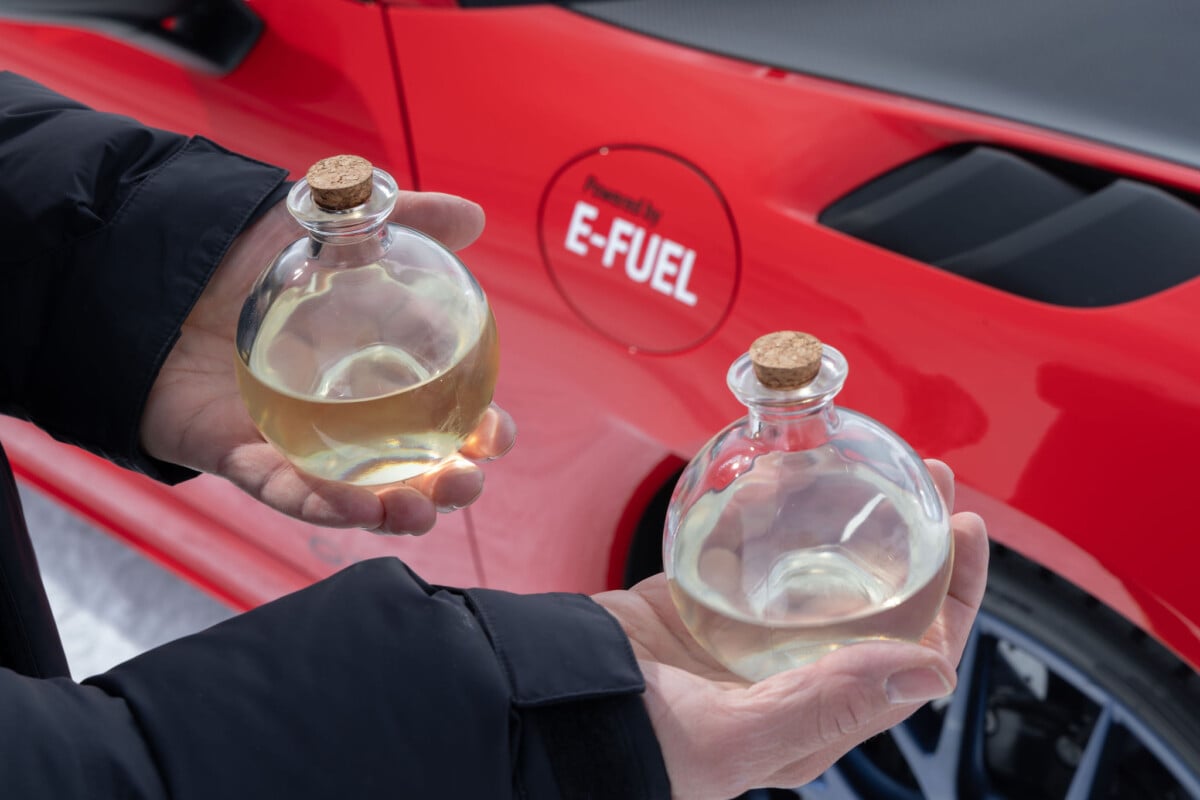Nine countries have rallied under the leadership of Germany to fight against the decision of the European Union to ban the sale of thermal cars on the territory in 2035. But there is no question of continuing to authorize diesel and gasoline. The idea is to authorize the sale of synthetic fuel, also called e-fuel or e-fuel.
From 2035, the sale of thermal cars should be completely banned in Europe, with a few exceptions for manufacturers selling less than 10,000 vehicles per year. Plug-in hybrids will also be affected, although a report recently proved that they are very polluting, whatever Toyota says. But it could finally be that things change, while this subject continues to be debated.
A new covenant
If thehe European Commission and Parliament have already voted in favor of this measure, in order to reduce by 100% polluting emissions from the automobile industry, nothing has yet been acted upon. Indeed, the member countries also have their say and must therefore give their opinion in order for this measure to be ratified. However, it would seem that everything is not so simple, since the latter is far from unanimous in Europe.
Indeed, Germany recently claimed to be totally opposed to this law and had threatened not to want to vote in favor of it. The country, represented by Chancellor Olaf Scholz deplores the fact that synthetic fuelsin which the government strongly believes, is not one of the exemptions. But our neighbors across the Rhine are not the only ones to be firmly opposed to this measure.
? End of thermal cars in 2035: while Germany and other countries reluctant to vote for the measure are meeting in Strasbourg today, Bruno Le Maire announces that “France is ready to go to the standoff on this subject “.
@franceinfopluspic.twitter.com/Eadl98ybe5– France TV Europe (@FranceTVEurope) March 13, 2023
Initially, these are seven countries that initially decided to rebel against the European Union and to form an informal union in order to protest, as explained in an article by the American agency Reuters. These are Italy, Czech Republic, Slovakia, Hungary, Poland as well as Romania. But now Austria and Bulgaria have decided to join the movement.
An alliance which thus makes it possible to avoid any majority in the Council during the vote. France sees this with a very dim view, while the Minister for the Economy affirmed on France Info that the country is ready to go arm wrestling“. The government describes this alliance as “ environmental fault“, claiming that ” it is a fault at the economic level because we have five to ten years behind the electric vehicle compared to China“.
Synthetic fuel approval?
For several months, specialists have indeed been sounding the alarm about the growing invasion of Asian manufacturers in Europe. For their part, the nine countries of the alliance affirm that a total ban on internal combustion cars is the wrong approach. This is in any case what affirms Volker Wissing, German Minister of Transport on the site Automotive News Europe.
The country wants synthetic fuels are authorized after 2035 throughout the European Union. An authorization which represents a major challenge, since Porsche has been working on the development of its e-fuel for several years. The firm has even just inaugurated a factory in Chile to start industrial production. However, this alternative is still very expensive, so much so that the manufacturer is now seeking public funding.
When announcing the financial results, Porsche boss Oliver Blume said he thought ” that e-fuels can play a useful complementary role for the large number of existing cars and niche segments “as we can read in an AFP dispatch relayed by the site Knowledge of Energies.

Moreover, if the manufacture of this fuel is in theory cleaner, sinceit does not use fossil fuels, all is not rosy. Because it requires more resources, not to mention that this alternative does not prevent the emission of polluting gases into the atmosphere. However, and as we were able to test, this type of fuel is rather convincing to drive.
In addition, these seven European ministers met at a meeting from which France was absent, to discuss the recent Euro 7 standard. Several countries notably stated that the deadlines were much too short, while this will come into force from 2025. For the record, it notably requires new cars to reduce nitrogen oxide (NOx) emissions by 35%.
Numerama specifies that ” the ministers concerned must, however, work quickly to prove that their intention is not to stall the agreement process indefinitely. Czech Transport Minister Martin Kupka said a proposal would be presented “in the next few days or two weeks”.
To follow us, we invite you to download our Android and iOS application. You can read our articles, files, and watch our latest YouTube videos.
